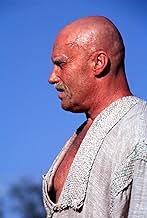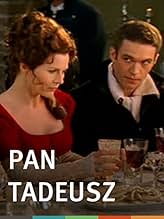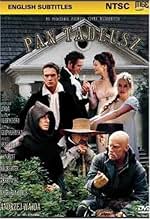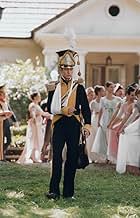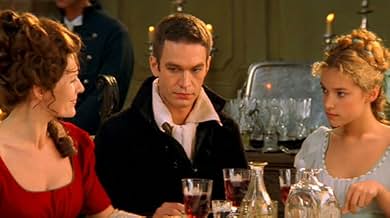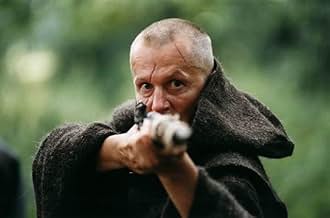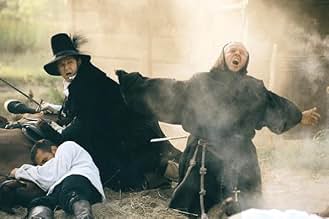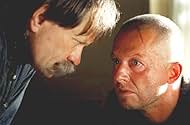In the early 1810s, Poles, part of Russia's client state of Lithuania, think independence will come if they join forces with Napoleon when he invades Russia. This unity of purpose, in one di... Read allIn the early 1810s, Poles, part of Russia's client state of Lithuania, think independence will come if they join forces with Napoleon when he invades Russia. This unity of purpose, in one district, is undermined by two families, feuding since the head of one shot the head of the ... Read allIn the early 1810s, Poles, part of Russia's client state of Lithuania, think independence will come if they join forces with Napoleon when he invades Russia. This unity of purpose, in one district, is undermined by two families, feuding since the head of one shot the head of the other twenty years before. There are hopes of a reconciliation through a marriage of Pan T... Read all
- Awards
- 7 wins & 5 nominations
- Zosia Horeszkówna
- (as Alicja Bachleda-Curus)
- Rykow
- (as Siergiej Szakurow)
Storyline
Did you know
- TriviaA polonaise composed by Kilar for this soundtrack gained a nation-wide recognition and became the opening tune for most high school proms. Before the movie the first dance was traditionally accompanied by Chopin.
- ConnectionsReferenced in Poranek kojota (2001)
The goals of watching being purely patriotic, the movie appeared to us as convincing, more to say, interesting from the very beginning. However, the experience of the movie was not merely a patriotic awareness that would truly be applied to a limited number of viewers but something much more, something I would like to share with other people no matter what nationality, upbringing, culture they are - a treasure that seems lost in most modern movies yet found in the great effort to craft cinematic productions based on classical literature. Certainly, it is a serious effort to adapt 1800s' romantic verses to the expectations of modern movie buffs...
"O Lithuania, my country, thou Art
like good health; I never knew till now
How precious, till I lost thee."
(translation by Kenneth R. Mackenzie)
That is how PAN TADEUSZ by Adam Mickiewicz begins, that is how PAN TADEUSZ by Andrzej Wajda ends and what is in between?
A great story of courage, love, sensation, uprising, honor, politics (in the times of Napoleon - a great hope for the partitioned Poland), confession and ... reconciliation: something classical, universal, touching, humane, pure and upright. One could indeed enumerate such adjectives... How does it work in practice? On the one hand, we have a particular focus on national identity and duty while, on the other hand, the emphasis is drawn upon particular characters. To view comes young Tadeusz Soplica (Michal Zebrowski) in love with two female characters: one is Zosia (Alicja Bachleda) – a 14-year-old girl of youthful, innocent joys; the other is Telimena (Grazyna Szapolowska) - a lady of extravagant behavior and tastes of luxury. In between come various characters, including impetuous Gerwazy (Daniel Olbrychski), young count-artist Horeszko (Marek Kondrat), and a humble priest Robak (Boguslaw Linda) who hides his secret till the very last hour of his life ...
The factor that goes with characters and, more specifically, the manner we perceive them is the strongest point of the movie: performances. Although the task to play the roles and say their lines in poem appears to be particularly difficult, most of the cast craft their performances with exceptional flair. It is thanks to them that we all may feel the story go on naturally. Daniel Olbrychski is magnificent as Gerwazy focusing on the aforementioned impetuosity, Boguslaw Linda can be referred to as 'convincing modesty', Ms Szapolowska says her lines with desirable elegance and Michal Zebrowski together with youthful Alicja Bachleda are a fine staff for the couple in love.
Since Mickiewicz payed particular attention to the descriptions of nature, the film does not skip this aspect. It can boast wonderful shots of the green fields, memorable clouds, returning storks, silent forests and beautiful sunsets. Being filmed in an artistic manner, it evokes a unique atmosphere and constitutes a sort of moving painting of idyllic landscapes. The narration by Adam Mickiewicz portrayed by Krzysztof Kolberger adds more importance to it providing the emotions of the author. The brilliant direction by Andrzej Wajda and the musical score by Wojciech Kilar supply a viewer with undeniable experience. Moreover, some scenes remain so intensely in the memory that any sensitive viewer (sensitive to art) will truly be absorbed by watching. Here, I would like to mention famous bear hunting, confession of Jacek Soplica and witty but elegant coffee making sequence. Just a pity there is not a famous mushroom picking tour described widely by Mickiewicz.
If you asked me what this movie means to me, my answer would be simple: an experience for eyes and soul, great cinema which returns after a period of absence, which returns like the upright storks that long for the sublimity of patriot's homeland.
- marcin_kukuczka
- Nov 10, 2009
- Permalink
- How long is Pan Tadeusz: The Last Foray in Lithuania?Powered by Alexa
Details
- Release date
- Countries of origin
- Language
- Also known as
- Pan Tadeusz: The Last Foray in Lithuania
- Filming locations
- Oporów, Lódzkie, Poland(castle)
- Production companies
- See more company credits at IMDbPro
Box office
- Budget
- PLN 12,500,000 (estimated)
- Runtime2 hours 27 minutes
- Color
- Sound mix
- Aspect ratio
- 2.35 : 1
Contribute to this page


